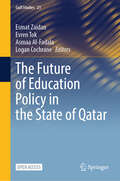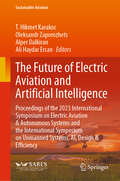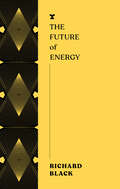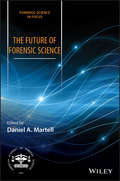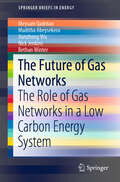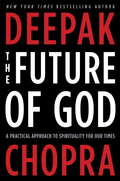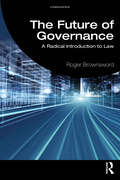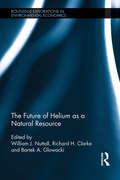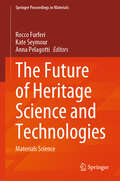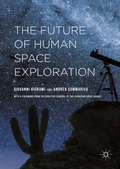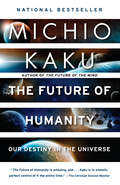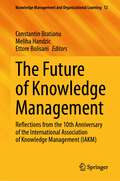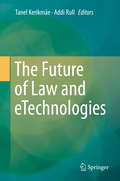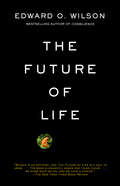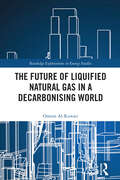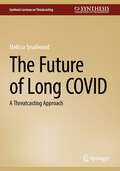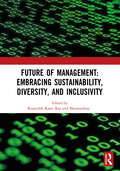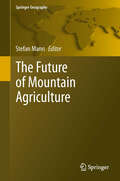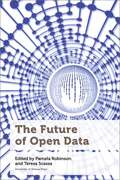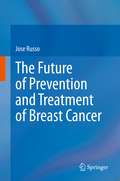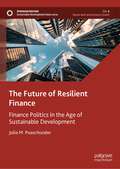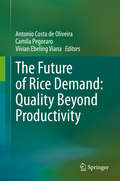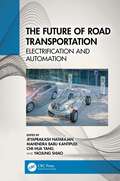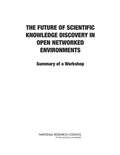- Table View
- List View
The Future of Education Policy in the State of Qatar (Gulf Studies #21)
by Esmat Zaidan Evren Tok Asmaa Al-Fadala Logan CochraneThis open access book provides a topical overview of education, development plans, the knowledge economy, and human development in the State of Qatar, focusing on socio-political and cultural challenges, from a policy perspective. It describes the ecosystem of education and its features, impacts, and the factors that facilitate or inhibit its current shape and development, including the pendulum of internationalization versus localization of education and indigenous knowledge. The book serves as an arena to engage vital discourse on the importance of early childhood education and inclusive education systems, particularly for those with diverse abilities. In view of the transformations occurring in the education systems in the Gulf Region over the past few decades, the book examines the advancement of education in Qatar and the critical political, economic, and cultural influences shaping education development plans, reforms, and policies. The book identifies the key factors and barriers that continue to hinder governmental initiatives in the region, in terms of the need to elevate the quality of key fields. The authors unpack the requirements imposed on policymakers in the broader Gulf region and pinpoint the need for Qatar to adopt more sustainable and state-of-the-art education policies, programs, and tools, to ameliorate the quality of education. In doing so, the book draws an all-inclusive portrayal of education in the country and its links to human and economic development. It identifies the transformations required to adapt to changing conditions, particularly within a dynamic and increasingly competitive job market. Bringing together academics and experts in public policy, education, development, and related social sciences in the Arabian Gulf, this book contributes to co-creating innovative and multidisciplinary solutions within higher education, relevant to both students and scholars in these respective fields.
The Future of Electric Aviation and Artificial Intelligence: Proceedings of the 2023 International Symposium on Electric Aviation & Autonomous Systems and the International Symposium on Unmanned Systems, AI, Design & Efficiency (Sustainable Aviation)
by T. Hikmet Karakoc Oleksandr Zaporozhets Alper Dalkiran Ali Haydar ErcanThe Future of Electric Aviation and Artificial Intelligence presents a unique collection of proceedings papers from two multi-disciplinary symposiums on sustainable aviation and unmanned systems, offering a comprehensive view of the latest research and insights. The International Symposium on Electric Aviation and Autonomous Systems (ISEAS 2023) presents aerospace, autonomous, and piloted unmanned systems research. The International Symposium on Unmanned Systems, AI, Design & Efficiency (ISUDEF 2023) gathers researchers, scientists, engineers, practitioners, policymakers, and students working on topics in the unmanned systems industry and artificial intelligence (AI). The collected papers provide insights on a broad range of current issues in aviation, including hybrid, electric, all-electric, and fuel cell aerial vehicles, electric generation, energy storage, propulsion technology, design issues, AI applications, efficient operations, and new identification and detection systems that adapt to the latest technology standards. ISEAS 2023 and ISUDEF 2023 allow researchers, scientists, engineers, practitioners, policymakers, and students to exchange information and professionals to present new technologies and developments and discuss future direction, strategies, and priorities in aviation and sustainability.
The Future of Energy (The FUTURES Series)
by Richard BlackHow will the world produce more, cleaner energy? Climate communications expert Richard Black sets out a vision for the future which could benefit us all.Coal, oil and gas provide four-fifths of the energy that powers our modern world. But continuing to burn them will mean wrecking the only planet we have. Is there a way out?In The Future of Energy, journalist and analyst Richard Black argues that there is, and that the transition to a clean energy world is already underway. He shows that with just five key technologies we can replace the burning of fossil fuels almost entirely, as quickly as society decides.Doing so will do much more than halt climate change. The transition will bring cheaper energy, cleaner air, and more jobs. It will remove some of the factors behind oppression, injustice, and conflict. And it is supported by an overwhelming majority of the world&’s population. This may not be the story of energy that you hear most about from politicians, business leaders and journalists, but it is the one that matters.
The Future of Forensic Science: Current Research And Practice Leading To Future Opportunities (Forensic Science in Focus)
by Daniel A. Martell Douglas H. UbelakerOffers a diverse, interdisciplinary, and eye-opening view of the future direction of forensic science This one-of-a-kind book is a collection of content from the Past and Current Presidents of the American Academy of Forensic Sciences—providing readers with all of their forensic science experience, knowledge, insight, and wisdom. It envisions where forensic science will be a decade from now and the impact of these emerging advances on the law (along with our place in it), emphasizing theoretical advances, innovative leads from the laboratory, and emerging technologies. Filled with information from some of the greatest forensic minds of their generation, The Future of Forensic Science covers all of the eleven sections that comprise the AAFS. It discusses new directions in forensic anthropology, and looks at the future of such disciplines as criminalistics, forensic engineering science, forensic psychiatry and behavioral science, forensic toxicology, and forensic document examination. It also touches on the current and future state of digital and multimedia sciences. Contains contributions from an eminent group of forensic science experts Presents a valuable repository of forensic science experience, knowledge, insight, and wisdom Offers an insightful interdisciplinary look at the future of forensic science and how it is changing forensic science for the better Timed to coincide with the NIST forensic science initiative and the OSAC process The Future of Forensic Science is a must-have book for practicing forensic science professionals, academics, and advanced undergraduate and graduate students in forensic science. This book is published as part of the AAFS series ‘Forensic Science in Focus’.
The Future of Gas Networks: The Role of Gas Networks in a Low Carbon Energy System (SpringerBriefs in Energy)
by Meysam Qadrdan Muditha Abeysekera Jianzhong Wu Nick Jenkins Bethan WinterThis book investigates the role of gas networks in future low-carbon energy systems, and discusses various decarbonisation pathways, providing insights for gas network operators, developers, and policy makers. As more countries around the world move towards low-carbon energy systems and increase their exploitation of renewable energy sources, the use of natural gas and the associated infrastructure is expected to undergo a substantial transformation. As such there is a great uncertainty regarding the future role of gas networks and how they will be operated in coming years.The topics addressed include:Fundamentals of gas network operationThe impact of variable renewable electricity generation on the operation and expansion of gas networksThe impact of decarbonising heat supplies on gas networksOpportunities and challenges of utilising gas networks to transport alternative low-carbon gases such as bio-methane and hydrogen
The Future of God
by Deepak ChopraFrom the New York Times Bestselling Author. Can God be revived in a skeptical age? What would it take to give people a spiritual life more powerful than anything in the past? Deepak Chopra tackles these issues with eloquence and insight in this book. He proposes that God lies at the source of human awareness. Therefore, any person can find the God within that transforms everyday life. God is in trouble. The rise of the militant atheist movement spearheaded by Richard Dawkins signifies, to many, that the deity is an outmoded myth in the modern world. Deepak Chopra passionately disagrees, seeing the present moment as the perfect time for making spirituality what it really should be: reliable knowledge about higher reality. Outlining a path to God that turns unbelief into the first step of awakening, Deepak shows us that a crisis of faith is like the fire we must pass through on the way to power, truth, and love. "Faith must be saved for everyone's sake," he writes. "From faith springs a passion for the eternal, which is even stronger than love. Many of us have lost that passion or have never known it." In any age, faith is a cry from the heart. God is the higher consciousness that responds to the cry. "By itself, faith can't deliver God, but it does something more timely: It makes God possible." For three decades, Deepak Chopra has inspired millions with his profound writing and teaching. With The Future of God, he invites us on a journey of the spirit, providing a practical path to understanding God and our own place in the universe. Now, is a moment of reinvigoration, he argues. Now is moment of renewal. Now is the future.
The Future of Governance: A Radical Introduction to Law
by Roger BrownswordThis book offers a radically different introduction to law, one that reflects the challenges and opportunities presented by the rapid technological developments of our time.Traditionally, law has been about historic principles and rules and their application to a particular set of facts; and courts, judges, and disputes have been central to the legal enterprise. Against this approach, this book highlights four radical and revisionist ideas: by bringing modern technologies into the foreground; by presenting law as one particular mode of governance in a larger picture of governance that now includes technological modalities; by insisting that we have to think outside the traditional doctrinal box to engage with a broad range of governance questions; and by emphasising that human communities cannot flourish without good governance to which both lawyers and law are central. These four radical threads are woven into a discussion of the modern landscape of law, and together they offer a distinctly contemporary contribution to the quest for good governance. The challenge for lawyers now, the book maintains, is to contribute to thinking, both locally and globally, about how we take advantage of the opportunities presented by the newest technology, without compromising the essential conditions for human life and co-existence, and without losing what we value in law’s governance.This book is aimed at students who are studying law at university and legal academics, and others, interested in the current and future impact of technology on law.
The Future of Helium as a Natural Resource (Routledge Explorations In Environmental Economics Ser.)
by William J. Nuttall Richard H. Clarke Bartek A. GlowackiThe book reveals the changing dynamics of the helium industry on both the supply-side and the demand-side. The helium industry has a long-term future and this important gas will have a role to play for many decades to come. Major new users of helium are expected to enter the market, especially in nuclear energy (both fission and fusion). Prices and volumes supplied and expected to rise and this will prompt greater efforts towards the development of new helium sources and helium conservation and recycling.
The Future of Heritage Science and Technologies: Materials Science (Springer Proceedings in Materials #70)
by Rocco Furferi Kate Seymour Anna PelagottiThis book features selected contributions from Florence Heri-Tech 2024, showcasing cutting-edge technologies for the analysis, conservation, and restoration of cultural heritage. It explores advancements in materials science, including nanotechnology and plasma-based restoration, as well as innovative diagnostic methods. The book provides insights into biotechnology, tailored materials, and novel physical techniques, offering a comprehensive overview of emerging trends in heritage preservation.
The Future of Human Space Exploration
by Giovanni Bignami Andrea SommarivaFor several decades it has been widely accepted that human space exploration is the exclusive domain of government agencies. The cost of performing such missions, estimated in multiple reports to amount to hundreds of billions dollars over decades, was far beyond what private entities could afford. That arrangement seems to be changing. Buoyed by the success of its program to develop commercial cargo capabilities to support the International Space Station, NASA is becoming increasingly open to working with the private sector in its human space exploration plans. The new private-public partnership will make 'planet hopping' feasible. This book analyses the move towards planet hopping, which sees human outposts moving across the planetary dimensions, from the Moon to Near-Earth Asteroids and Mars. It critically assesses the intention to exploit space resources and how successful these missions will be for humanity. This insightful and accessible book will be of great interest to scholars and students of space policy and politics, international studies, and science and technology studies.
The Future of Humanity: Terraforming Mars, Interstellar Travel, Immortality, and Our Destiny Beyond Earth
by Michio Kaku<P> The #1 bestselling author of The Future of the Mind traverses the frontiers of astrophysics, artificial intelligence, and technology to offer a stunning vision of man's future in space, from settling Mars to traveling to distant galaxies. <P> Formerly the domain of fiction, moving human civilization to the stars is increasingly becoming a scientific possibility--and a necessity. Whether in the near future due to climate change and the depletion of finite resources, or in the distant future due to catastrophic cosmological events, we must face the reality that humans will one day need to leave planet Earth to survive as a species. <P> World-renowned physicist and futurist Michio Kaku explores in rich, intimate detail the process by which humanity may gradually move away from the planet and develop a sustainable civilization in outer space. He reveals how cutting-edge developments in robotics, nanotechnology, and biotechnology may allow us to terraform and build habitable cities on Mars. He then takes us beyond the solar system to nearby stars, which may soon be reached by nanoships traveling on laser beams at near the speed of light. Finally, he brings us beyond our galaxy, and even beyond our universe, to the possibility of immortality, showing us how humans may someday be able to leave our bodies entirely and laser port to new havens in space. <P>With irrepressible enthusiasm and wonder, Dr. Kaku takes readers on a fascinating journey to a future in which humanity may finally fulfill its long-awaited destiny among the stars. <P><b> A New York Times Bestseller</b>
The Future of Knowledge Management: Reflections from the 10th Anniversary of the International Association of Knowledge Management (IAKM) (Knowledge Management and Organizational Learning #12)
by Constantin Bratianu Meliha Handzic Ettore BolisaniThis edited volume explores the challenges and opportunities of knowledge management (KM) in the post-pandemic world. Intangibles have become dominant resources, and their effective management is key to navigating the complexity of the new business environment. The book is divided into three parts, each focusing on a different aspect of KM: complexity, human factors, and technology.Through 15 chapters by 28 contributors from 18 countries, this collection offers a diverse range of perspectives on the evolution of KM over the past decade and its potential for the future. The contributors analyze topics such as digital transformation, distant reading, knowledge visualization, and advanced KM systems. This volume will be of interest to researchers and practitioners in the field of KM, as well as to anyone interested in the challenges and opportunities facing organizations in the post-pandemic world.This edited volume celebrates the 10th anniversary of the International Association for Knowledge Management, offering an overview of the field's achievements and prospects for innovation and sustainability.
The Future of Law and eTechnologies
by Tanel Kerikmäe Addi RullThis book presents groundbreaking discussions on e-residency,cryptocurrencies, scams, smart contracts, 3D printing, software agents, digitalevidence and e-governance at the intersection of law, legal policies and moderntechnologies. The reader benefits from cutting-edge analyses that offer ideasand solutions to some of the most pressing issues caused by e-technologies. This collection is a useful tool for law and IT practitioners and aninspiring source for interdisciplinary research. Besides serving as a practicalguideline, this book also reflects theoretical dimensions of futureperspectives, as new technologies are not meant to change common values but toaccommodate them.
The Future of Life
by Edward O. WilsonOne of the world’s most important scientists, Edward O. Wilson is also an abundantly talented writer who has twice won the Pulitzer Prize. In this, his most personal and timely book to date, he assesses the precarious state of our environment, examining the mass extinctions occurring in our time and the natural treasures we are about to lose forever. Yet, rather than eschewing doomsday prophesies, he spells out a specific plan to save our world while there is still time. His vision is a hopeful one, as economically sound as it is environmentally necessary. Eloquent, practical and wise, this book should be read and studied by anyone concerned with the fate of the natural world.
The Future of Life
by Edward O. WilsonOur world is far richer than previously conceived, yet so ravaged by human activity that half its species could be gone by the end of the present century. These two contrasting themes - unexpected magnificence and underestimated peril - have originated during the past two decades of research. In this timely and important new book, one of our greatest living scientists describes exactly what treasures of the natural world we are about to lose forever and what we can do right now to save them. Destruction of natural habitats, the rampant spread of invasive species, pollution, uncontrolled population growth and over harvesting are the main threats to our natural world. Wilson explains how each of these elements works to undo the web of life that supports us, and why it is in our best interests to stop it. The Future of Life is a magisterial accomplishment - both a moving description of the world's astonishing animals and plants and a guidebook for the protection of all its species, including our own.
The Future of Liquified Natural Gas in a Decarbonising World (Routledge Explorations in Energy Studies)
by Omran Al-KuwariThis book analyses the role of liquified natural gas in a decarbonising world and presents the most significant energy-transition options and implications for the liquified natural gas industry.Major investments and developments in technology have been made in recent years in an attempt to meet global demand, but energy systems require radical new pathways to meet climate goals in line with the Paris Agreement. This book explores the role of liquified natural gas in the context of the global energy transition, arguing that liquified natural gas has a role to play in terms of resources, the gas market, energy-transition dynamics/regime status, and geopolitical powers. Using a bespoke meta-framework grounded in institutional theory and case studies, the book examines how institutional, political, and resource characteristics affect liquified natural gas use. The book also explores implications for liquified natural gas exporters in the context of the energy transition and analyses the characteristics of liquified natural gas compared with pipeline gas. The multiple case study approach examines the role of natural gas in Japan, the UK, and China, three countries in different stages of the energy transition, to determine potential pathways for exporters. Utilising a multi-method procedure for data collection, including data analysis, in-depth interviews, and direct observations, the book concludes with findings on the potential role of liquified natural gas in various future stages of the energy transition.Written by an industry expert, this book will be of value to students, researchers, and academics interested in energy studies, decarbonisation studies, and environmental studies more broadly.
The Future of Long COVID: A Threatcasting Approach (Synthesis Lectures on Threatcasting)
by Melissa SmallwoodThis book provides an overview of Long COVID, the chronic illness and disability that can result from COVID-19 infection in 20–30% of survivors. It approaches the topic through its larger social, political, and historical context utilizing the Threatcasting methodology for scenario-based foresight. The book brings together multiple perspectives on Long COVID, such as patient experiences, healthcare system impacts, historical frameworks, and the information ecosystem surrounding COVID to explore the long-term structural implications of Long COVID beyond the current acute crisis. It is intended to be a guide for policy makers, healthcare providers, researchers, and anyone whose work will play a role in mitigating the long tail of COVID-19. Framing the pandemic within a historical and political framework while approaching Long COVID from the future-casting perspective, this book seeks to disentangle the issues posed by Long COVID from the current moment and is intended to establish new ways of thinking about and preparing for similar complex, over-the-horizon potential threats. The first book to apply the Threatcasting framework to a public-health issue like COVID-19Draws together multiple perspectives of Long COVID that were previously discussed independently within their fieldsComprehensively examines the history and future of Long COVID
Future of Management: Proceedings of ICMR-2024
by Koustubh Kanti RayIn response to unparalleled challenges and opportunities, the scope of management is undergoing a profound transformation. Organisations must adapt and innovate in order to flourish in an era characterised by rapid technological advancements, climate change, shifting demographics, and evolving social norms. The three pillars of modern management— sustainability, diversity, and inclusivity—reflect a comprehensive approach that prioritises the well-being of people and the planet over short-term profits and reflects a commitment to social responsibility. In the current era of management, sustainability has emerged as a critical issue. Organisations must incorporate ethical considerations into their decision-making processes, reduce their carbon footprints, and implement eco-conscious practices as the effects of climate change become more severe. According to Paul Polman, the former CEO of Unilever, “Sustainability is not a charity; it is a business case.”
The Future of Mountain Agriculture
by Stefan MannMountain agriculture is a socially and culturally unique system, but also a regionally important economic sector. In a globalising world, it is clear that fertile areas on all continents will always be used to produce large quantities of agricultural products in order to feed the world and, increasingly, provide biomass as a source of energy. It is far less clear, however, how land use in steep and more peripheral regions will evolve. By definition, farmland in mountain areas is more difficult to work because of steep slopes and missing accessibility. Climate conditions and poor soil quality often add to these adverse conditions. Through overcoming limited views from one region only or from one discipline, this book intends to draw a first truly international perspective on the issue of mountain farming.
The Future of Open Data (Law, Technology, and Media)
by Peter Johnson Tenille Brown Michael Geist Claus Rinner Tracey Lauriault Christine Varga Elizabeth Judge Fernando Perini Haewon Chung Ian Parfitt Lisa Ward Mather Renee Sieber Sarah GreeneThe Future of Open Data est issu d’un projet de recherche en partenariat subventionné pendant plusieurs années par le Conseil de recherches en sciences humaines (CRSH) qui vise à explorer les données gouvernementales géospatiales ouvertes dans une perspective interdisciplinaire. Les chercheurs associés à cette subvention ont adopté une perspective critique en sciences sociales basée sur l’impératif voulant que la recherche devrait être pertinente à la fois pour le gouvernement et pour les partenaires de la société civile œuvrant dans ce domaine.Cet ouvrage s’appuie sur les connaissances développées durant la période de validité de la subvention et soulève la question : « Quel est l’avenir des données ouvertes ? » Les collaborateurs partagent leurs idées à propos de l’avenir des données ouvertes à la suite d’observations et de recherches menées pendant cinq ans sur la communauté des données ouvertes canadiennes selon une perspective critique de ce qui pourrait et ce qui devrait arriver dans un contexte où évoluent les efforts concernant les données ouvertes.Chaque chapitre de ce livre aborde une diversité d’enjeux tout en s’appuyant sur des perspectives disciplinaires ou interdisciplinaires. Le premier chapitre retrace les origines des données ouvertes au Canada et la manière dont la situation a évolué jusqu’à aujourd’hui, en tenant compte du croisement entre le mouvement de souveraineté des données autochtones et les données ouvertes. Quelques chapitres se penchent sur certains dangers et sur les possibilités des données ouvertes, à leurs limites et même aux responsabilités qui s’y rattachent. Une autre série de chapitres examine les horizons appropriés pour les données ouvertes, incluant les données ouvertes dans le Sud global, les priorités des gouvernements locaux en matière de données et le contexte émergent des données ouvertes dans les milieux ruraux.
The Future of Prevention and Treatment of Breast Cancer
by Jose RussoThe objective of this book is to provide a critical analysis of the present prevention strategies for breast cancer, emphasizing the cost benefits and quality of life of the patient. Rooted in the present knowledge of breast cancer biology and prevention and treatment options, the book will describe the future tools that could be available to oncologists and how these new approaches may change the landscape of recurrence and survival of the disease. Special emphasis will be given to the prevention strategies counterposing the present limitations and conflicting prevention guidelines for both hereditary and preventive non-hereditary breast cancer, and propose how the implementation of new strategies based on the present knowledge could save millions of lives and be more cost efficient. The book will present a critical status of the treatment and prevention of breast cancer and detail how a quantum leap could be achieved in the field by applying present basic research knowledge to clinical application.
The Future of Resilient Finance: Finance Politics in the Age of Sustainable Development (Sustainable Development Goals Series)
by Julia M. PuaschunderThis book envisions the future of resilient finance and the societal value of responsible investment. Capturing the Zeitgeist of our post-pandemic new Renaissance, the book describes the contemporary use of economics to improve environmental conditions, widen access to health care, and foster social justice. The Future of Resilient Finance helps students, research scholars, and interdisciplinary global governance practitioners understand resiliency management through strategic finance and responsible economics as a politics and international relations tool. The new age of resilient finance captures monetary means as a source of politics, diplomacy, and international aid. The current outpouring of rescue and recovery funds is portrayed as new generation of resilient finance aimed at peace and prosperity for humankind. The integration of environmental, social, and governance criteria in portfolio choices is covered to grant sustainable value of finance for society.
The Future of Rice Demand: Quality Beyond Productivity
by Antonio Costa de Oliveira Camila Pegoraro Vívian Ebeling VianaThis book aims to provide an overview of the challenges and available technologies to improve rice and provide a response to the challenge posed by increasing world population and the resultant food shortages. Nutritional aspects of rice products and omics and the molecular technologies currently being used are covered in depth. As a staple food for over 50% of the world´s population, an estimated 9 billion people will need to be fed by 2050, and healthy and uncontaminated foods need to reach consumers in developed and developing countries.This makes quality beyond productivity incredibly important and is one of the overriding themes of this work. The Future of Rice Demand: Quality Beyond Productivity offers researchers a better understanding of the nutritional aspects of rice. Omics technologies applied to cereal grain quality have been scarce in the literature published to date, making this text an excellent single source for researchers in regions where rice is a major crop. The first section of the book focuses on the major aspects of the industrial processing of all rice types. Further sections look at contamination prevention and biofortification, special rice types, and omics and other molecular tools used in the mass production and processing of healthy rice products.
The Future of Road Transportation: Electrification and Automation
by Jeyaprakash Natarajan Mahendra Babu Kantipudi Che-Hua Yang Yaojung ShiaoThe Future of Road Transportation presents rapidly growing research towards electrified and automated vehicles. It explains the workings and drawbacks of a conventional vehicle’s powertrain, braking, and steering systems before exploring ADAS equipment and driverless car technologies. Emphasizing the necessary changes in conventional transport systems towards sustainable and smart mobility, this book discusses advanced future mobility technologies and the challenges and considerations for developing sustainable vehicle designs. It overviews the construction details and the research-level contents of the power train, battery, charging infrastructure, and other control systems of the electrical vehicles. The book is intended for automotive and electrical engineers and researchers working on electric vehicle technology, autonomous and automated vehicles, automotive sustainability. It will also be useful for mechanical and electrical engineering students taking courses in Automotive/Vehicle Engineering and Automotive Systems and Design.
The Future of Scientific Knowledge Discovery in Open Networked Environments: Summary of a Workshop
by Paul F. UhlirDigital technologies and networks are now part of everyday work in the sciences, and have enhanced access to and use of scientific data, information, and literature significantly. They offer the promise of accelerating the discovery and communication of knowledge, both within the scientific community and in the broader society, as scientific data and information are made openly available online. The focus of this project was on computer-mediated or computational scientific knowledge discovery, taken broadly as any research processes enabled by digital computing technologies. Such technologies may include data mining, information retrieval and extraction, artificial intelligence, distributed grid computing, and others. These technological capabilities support computer-mediated knowledge discovery, which some believe is a new paradigm in the conduct of research. The emphasis was primarily on digitally networked data, rather than on the scientific, technical, and medical literature. The meeting also focused mostly on the advantages of knowledge discovery in open networked environments, although some of the disadvantages were raised as well. The workshop brought together a set of stakeholders in this area for intensive and structured discussions. The purpose was not to make a final declaration about the directions that should be taken, but to further the examination of trends in computational knowledge discovery in the open networked environments, based on the following questions and tasks: 1. Opportunities and Benefits: What are the opportunities over the next 5 to 10 years associated with the use of computer-mediated scientific knowledge discovery across disciplines in the open online environment? What are the potential benefits to science and society of such techniques? 2. Techniques and Methods for Development and Study of Computer-mediated Scientific Knowledge Discovery: What are the techniques and methods used in government, academia, and industry to study and understand these processes, the validity and reliability of their results, and their impact inside and outside science? 3. Barriers: What are the major scientific, technological, institutional, sociological, and policy barriers to computer-mediated scientific knowledge discovery in the open online environment within the scientific community? What needs to be known and studied about each of these barriers to help achieve the opportunities for interdisciplinary science and complex problem solving? 4. Range of Options: Based on the results obtained in response to items 1-3, define a range of options that can be used by the sponsors of the project, as well as other similar organizations, to obtain and promote a better understanding of the computer-mediated scientific knowledge discovery processes and mechanisms for openly available data and information online across the scientific domains. The objective of defining these options is to improve the activities of the sponsors (and other similar organizations) and the activities of researchers that they fund externally in this emerging research area. The Future of Scientific Knowledge Discovery in Open Networked Environments: Summary of a Workshop summarizes the responses to these questions and tasks at hand.
